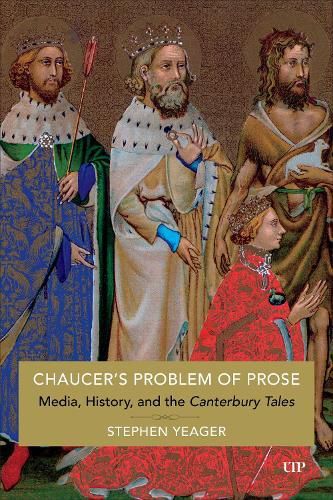Readings Newsletter
Become a Readings Member to make your shopping experience even easier.
Sign in or sign up for free!
You’re not far away from qualifying for FREE standard shipping within Australia
You’ve qualified for FREE standard shipping within Australia
The cart is loading…






In Geoffrey Chaucer's The Canterbury Tales, key structural moments arise when a speaker shifts from rhyming heroic couplets to address the reader in prose, as well as in instances where prose is mentioned but not employed. These interruptions may seem like glosses explaining Chaucer's intentions, yet they occur during the most contradictory moments of the frame narrative, making his aims particularly elusive. , Stephen M. Yeager argues that the presence of prose in The Canterbury Tales exposes the complexities of poetic form, manuscript technology, and the media ecology of medieval clerical culture. The book asserts that Chaucer's work is informed by his awareness of the significant role that Old English plays in early English monastic chronicles and cartularies, representing some of the earliest recorded uses of his chosen literary language. examines how these moments reveal Chaucer's anxieties about historical media and the central role of monastic historiography in documenting early English history.
$9.00 standard shipping within Australia
FREE standard shipping within Australia for orders over $100.00
Express & International shipping calculated at checkout
In Geoffrey Chaucer's The Canterbury Tales, key structural moments arise when a speaker shifts from rhyming heroic couplets to address the reader in prose, as well as in instances where prose is mentioned but not employed. These interruptions may seem like glosses explaining Chaucer's intentions, yet they occur during the most contradictory moments of the frame narrative, making his aims particularly elusive. , Stephen M. Yeager argues that the presence of prose in The Canterbury Tales exposes the complexities of poetic form, manuscript technology, and the media ecology of medieval clerical culture. The book asserts that Chaucer's work is informed by his awareness of the significant role that Old English plays in early English monastic chronicles and cartularies, representing some of the earliest recorded uses of his chosen literary language. examines how these moments reveal Chaucer's anxieties about historical media and the central role of monastic historiography in documenting early English history.